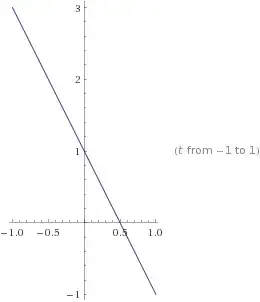$\newcommand{\psym}{\operatorname{P}_{\ge 0}}$ Let $\psym$ be the set of symmetric positive semidefinite (real) matrices.
Let $A \in \psym$ be on the boundary of $\psym$, i.e $\det A=0$ and let $B$ be a symmetric matrix such that $A+tB \in \psym$ for $t >0$ small enough.
Is it true that $A+B \in \psym$?
Why I think this might be true:
The intution is that if we are on the boundary of $\psym$, and we have some small perturbation which keeps us inside the space, than this perturbation must be in the "inward" direction from the boundary into the interior of the space. Thus, taking a larger step $(t >>0)$ in this direction will also keep us in the space.
Proof for the case when $A,B$ commute:
If $A,B$ commute, then they are simultaneously diagonalisable by an orthogonal matrix, i.e there exists $V \in O_n$ such that:
$$V^TAV=\Sigma_A,V^TBV=\Sigma_B , $$ so (remember $t>0$)
$$A+tB \ge 0 \Rightarrow V^T(A+tB) V=\Sigma_A+t\Sigma_B \ge 0\Rightarrow \Sigma_A+\Sigma_B \ge 0 \Rightarrow $$
$$ V (\Sigma_A+\Sigma_B) V^T=A+B \ge 0 $$
as required.
